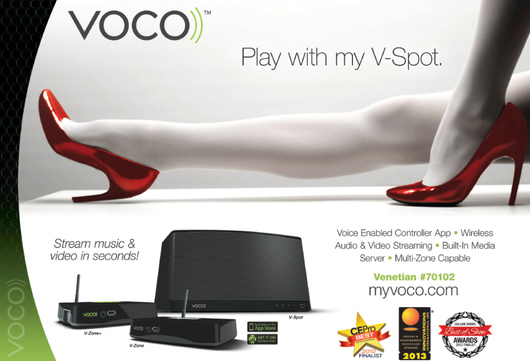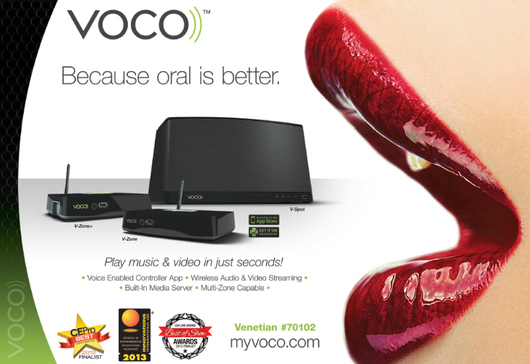Please Don't Play With My V-Spot
As you may have realized, we're somewhat partial to the sex-sells approach to advertising here at Adrants. That said, there are limits and there are matters of taste. Writing on Venture Beat, Jolie O'Dell brings to our attention a promotional email she was sent by voice-control company Voco touting their booth at next week's CES in Las Vegas.
Next to a pair of disembodied legs, the ad urges the reader to "Play with my V-Spot. Another image of a woman's red-lipped open mouth carries the headline, "Because oral is better."
Created by Dirk Marketing, the ads shamelessly tie the the product to a woman's vagina and the act of giving a blow job. O'Dell, a classy and refined woman if ever there was one - something you immediately realize once you meet her - eloquently castigates Voco for it's seemingly out of touch approach to marketing.
While there's certainly nothing wrong with a bit of tongue and cheek humor or light sexual innuendo in advertising once in a while, Voco's approach is akin to 6th grade boy's room bathroom humor - youthfully eager but sorely lacking the grace of intellectual wisdom and wit that comes with age.
Tying Voco's approach to advertising with the lack of women in the technology sector, the beat she has covered for years at Mashable, ReadWriteWeb and, now, VentureBeat, O'Dell writes, "Voco, I regret to inform you that I will be unable to visit your CES booth this year. I moreover regret that I will never review, recommend, or use your products, no matter how interesting and innovative they are. I most deeply regret that you don't have enough respect for me to put yourself on my level and look at the world and your ads through my or anyone else's eyes."
While a brand such as Voco may file this work under innocuous marketing silliness or dub O'Dell's reaction the rantings of a writer with a thorn in her side, when a journalist with O'Dell's clout and stature in the technology space calls for a boycott of the brand at the largest tech trade show in the world, Voco might want to take heed and respond in some manner. Sadly, that doesn't appear to be the case as the brand's last tweet was back in August 21.
O'Dell's article has had hundreds of Likes and Retweets along with hundreds of comments to the article itself. However, as is always the case, there are plenty who are calling this an over-reaction or a tempest in a tea cup.
One could argue that this is simply an ad targeting a predominantly male audience which uses the allure of sex (something pretty much everyone loves and can relate to) to raise awareness. One could also argue any form of advertising that ties a sexual act performed upon or by a woman to a product (other than a sex toy) devalues the product and the brand's potential customer base.
With an ad like this, the important question on must ask oneself is "does the ad objectify women or does it simply identify with a natural act in which all humans engage?"
So let's break it down. At last count, most woman enjoy (pardon our bluntness) having their V-Spot or vagina played with. At last count, most men enjoy (pardon our bluntness) having their hard ons orally stimulated. It would seem the Voco ad is simply tying pleasurable sexual acts that all humans love to their product line.
On the other hand, the ad isn't showing a man's finger (or tongue) going at a "V-Spot." In both visuals, the ad clearly focuses on the female. Why? We're not sure we have the answer but ask yourself this: why do most porn flicks (or regular flicks for that matter) focus heavily on the female versus the male? Why is the woman shown predominantly and the man rarely seen?
Wait. We may have the answer. Most viewers of porn-related material are predominantly (yes, we know the stats are a few years old) by men. Which, one could conclude, is why some advertising aimed at men includes sexually-charged imagery. Hey, we're no scientist but it would seem obvious that if men enjoy looking at sexually-charged images of women more-so than women enjoy looking at sexually-charged images of men, then it seems entirely logical for a brand targeting men to consider using sexual imagery in its advertising.
That said, there is a fine line of consideration (and intellect not found in the 6th grade boy's bathroom) that must take place when considering the use of sexual imagery in advertising. A marketer must be sure they leverage the humorous and positive aspects of sexual innuendo rather than more prurient and neanderthal version.
This Voco ad may, indeed, simply be a tempest in a teacup. But, for us, anything that sparks an intelligent conversation about the role of sex, sexual imagery, sexual innuendo and its relationship to how brands and consumers are portrayed is a worthy discussion in our book.



